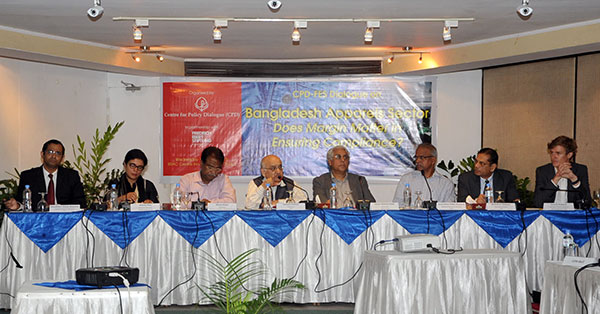Bangladeshi apparels industries should allocate additional margin for compliance in order to ensure labour welfare and thus increase sustainability of the sector.
Strengthening government’s institutional mechanism and social audit system set up by buyers and retailers would be essential to inspect factory-level compliance and maintain international standards.

The observations emerged from a dialogue on “Bangladesh Apparels Sector: Does Margin Matter for Ensuring Compliance?” organised by CPD in partnership with Friedrich Ebert Stiftung (FES), Bangladesh Office on Wednesday, 12 August 2015 at Brac Centre Inn, Dhaka.
Following welcome remarks from CPD Executive Director Professor Mustafizur Rahman, FES Resident Representative Mr Henrik Maihack urged to ensure fair wages, rights to unionism and government’s role in ensuring justice in the apparels industry and doing what is economically possible and socially necessary.
CPD Chairman Professor Rehman Sobhan observed that increasing export competitiveness at the cost of workers’ wellbeing is socially unjust and politically unsustainable. He proposed making the workers shareholders to positively include their contribution in the Global Value Chain (GVC) and thus make the industries sustainable.
CPD Additional Research Director Dr Khondaker Golam Moazzem shared findings from a CPD study, jointly conducted with CPD Senior Research Associate Mr Kishore Kumer Basak, which explored possible linkages between allocation of margin and maintaining firm level compliance. The study investigated whether compliance is being compromised in Bangladesh’s apparels sector, which is benefitting the market agents of the value chain.
The study revealed that a disjointed value chain is in operation in the apparels value chain of Bangladesh because existing structure and market forces put little emphasis on compliance. Expenditure in compliance is extremely low in comparison with other countries and in contrast with investments in industrial raw materials including fabric.
Designated Discussant Ms Rubana Huq, Managing Director, Mohammadi Group observed that due to high cost, maintaining compliance standards would remain challenging, especially without apparels industries regulating themselves by addressing real compliance issues instead of protecting reputation for business.
Industries need to promote descent and productive employment, improve working condition and in this way, agree on sharing the profit with the workers, observed another Discussant Mr Syed Sultan Uddin Ahmmed, Assistant Executive Director, Bangladesh Institute of Labour Studies (BILS).
Guest of Honour Mr Anisur Rahman Sinha, Former President, BGMEA felt that compliance is of least importance on the buyers’ side, who instead prioritise product quality, delivery time and low price. After bearing the expenditure in extra freight, import and custom duties for fabric, cost cutting in labour remains as the only solution. He cautioned that entrepreneurs need consider margin and sustainability before compliance, which is a non-negotiable requirement and not a choice.
Chief Guest Mr Mikail Shipar, Secretary, Ministry of Labour and Employment informed a number of measures on the government’s side, including adoption of National Tripartite Plan of Action of fire safety and amendment of Labour Act in 2013 to ensure workplace safety and promote trade unionism and collective bargaining respectively; implementation of sustainability compact, recruiting and training labour inspectors and facilitating factory inspection by Accord and Alliance.
CPD Distinguished Fellow Dr Debapriya Bhattacharya inquired how many factories could internalise compliance cost without access to finance and whether more profitable RMG companies were more compliant or not. Regarding public policy implication, he recommended harmonisation of standards across countries, adding that private buyers and merchandisers should not dictate compliance standards, instead public institutions should increasingly develop own policies and regulations.
The floor discussion was also attended by H E Mr Johan Frisell, Ambassador, Embassy of Sweden; Mr Zillul Hye Razi, Trade Advisor, European Union Delegation to Bangladesh; Mr Mark Chubb, Alliance for Bangladesh Workers Safety; Mr Arshad Jamal, Director, BGMEA; Mr K I Hossain, President, Bangladesh Garment Buying House Association; Dr Zafarullah Chowdhury, Trustee and Former Project Co-coordinator, Gonoshasthya Kendro (GSK); Mr Roy Ramesh Chandra, President, Sommilito Garments and Dorji Sromik League; Mr Sheikh Md. Kamrul Hasan, Senior Merchandizer, C&A; Mr Sirajul Islam Rony, President, Bangladesh Jatiyo Garments Sramik Kormochari League, among others.
TV News Clip on the Event
[Youtube_Channel_Gallery feed=”playlist” user=”PLlQrg2sIO-EyCrOLMFZ7mscJ-GDV_7MZ9″ videowidth=”580″ ratio=”16×9″ theme=”light” color=”white” autoplay=”0″ rel=”1″ showinfo=”1″ maxitems=”18″ thumb_ratio=”16×9″ thumb_width=”250″ thumb_columns_ld=”3″ thumb_columns_phones=”1″ thumb_columns_tablets=”4″ thumb_columns_md=”4″ title=”1″ description=”1″ descriptionwordsnumber=”20″
key=”AIzaSyA1mm3ICAhBQjVzwjpUMAe5Lb5FxbfloRo”]



